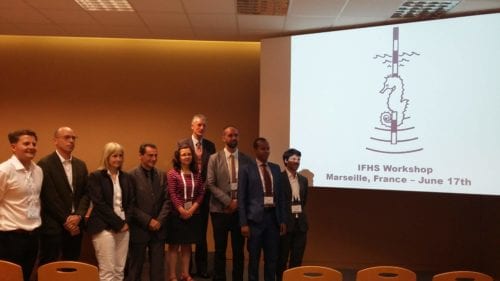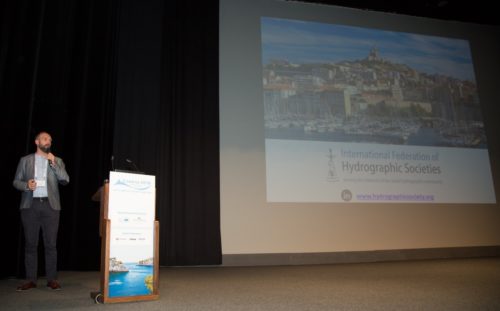Coverage of a workshop dedicated to the World Hydrography Day at OCEANS Conference, Marseille
27th September 2019
Paula B. Garcia Rosa
The OCEANS 2019 conference at Marseille, France, hosted a one-day hydrography workshop on 17th June 2019. It was organized by the International Federation of Hydrographic Societies (IFHS).
The workshop aimed to highlight hydrographic expertise and challenges. It was conducted a few days before the World Hydrography Day (WHD) – celebrated annually on the 21st of June.
The workshop
A welcome presentation from Eric Langlois from IFHS kicked off the workshop. He explained that the WHD 2019 theme “Hydrographic information driving Marine Knowledge” was the motivation for the workshop program. Eric talked about the areas of expertise in hydrography and shared a video1 from the International Hydrographic Organization (IHO) emphasizing the importance of hydrography to the world.
In the morning session, four speakers outlined aspects related to hydrographic data: standards, crowd-sourcing, and data rescue.
The session started with a presentation from Christophe Vrignaud (IHO), who gave an overview and updates on the Hydrographic Surveys Project Team (HSPT). This is a project team on standards for hydrographic surveys created in March 2017 to conduct a comprehensive review of the current standard S-44 and to develop future standards.
The second speaker, David Wyatt (IHO), discussed about the IHO Crowdsourced Bathymetry (CBS) initiative.
Story Index
- IFHS Workshop
- Introduction by Eric Langlois
- IHO Crowdsourced bathymetry initiative
- Naval hydrographic and Oceanographic service
- European Ocean observation system
- Global sea level observing system
- IFHS award
- Interview
Contributors
Paula B. Garcia Rosa, PhD, p.b.garcia-rosa@ieee.org

IFHS logo
He highlighted the importance of bathymetry data and the need to fill the gap on areas covered. As depicted in the video, depth data is not only used in nautical charts, but in a variety of applications such as - safety and storm surge/tsunami inundation models, ocean circulation/pollution models, coastal change analysis, sea level rise mitigation and climate modeling.
However, David drew attention to in interesting fact - Less than 15% of the world’s ocean depths have been measured, and about 50% of the world’s coastal waters shallower than 200 m remain unsurveyed. The rest of the data that compile seafloor maps are inferred depths from satellite observations. The role of CBS is to collect depth measurements obtained from marine vessels equipped with standard navigation instruments in routine maritime operations. The Crowdsourced Bathymetry Working Group aims at guiding and promoting such activities.

GENERAL BATHYMETRIC CHART OF THE OCEANS (GEBCO) WORLD MAP. “IMAGE REPRODUCED FROM THE GEBCO WORLD MAP 2014, www.gebco.net”
In the following, Corine Lochet (Naval Hydrographic and Oceanographic Service, SHOM) talked about their diffusion of data and knowledge initiative. The portal https://data.shom.fr/ provides access to SHOM data, where the marine charts are updated every week.
Corine also talked about the European Ocean Observation System (EOOS), a coordinating framework that aims at aligning, integrating and promoting Europe’s ocean observing capacity. EOOS gathers stakeholders and the ocean observing community, which includes the hydrographic community.
At the end of morning session, Yann Ferret (SHOM) discussed about sea level data rescue and their digitalization process of historical data. Their purpose is to provide high quality sea level data to scientists, to fulfill recommendations of the Global Sea Level Observing System (GLOSS) related to the recovery of forgotten sea level measurements, and to help policy makers to better plan risk management of coastal areas.
After the lunch break, the IFHS workshop resumed with an afternoon section dedicated to educational aspects of hydrography. The speakers discussed about certificate schemes, capacity building, academic courses, and collaborations (between countries, and between the hydrography community and other communities). This session also honored the 2018 and 2019 IFHS Student Award winners, respectively, Hamza Mazih and Chris Haddon, who gave presentations on their winning projects.

GROUP PHOTO OF IFHS WORKSHOP SPEAKERS AT THE END OF THE EVENT ON JUNE 17
Interview Eric Langlois during the Oceans 2019 conference at Marseille.
After the workshop, Earthzine talked to the event’s organizer, Eric Langlois. In this interview, Eric speaks a bit more about the event and the challenges faced by hydrographic community.
Q: What was the main motivation for organizing this workshop at OCEANS 2019 Marseille?
When I attended my first OCEANS conference last year in Kobe, Japan, I realized that despite the oceanographic and hydrographic communities being from specific areas of expertise, they obviously share common topics: maritime special planning, support to the Blue Economy and maritime policies, and protection of the marine environment.
So when I and Philippe Courtmontagne (chair of OCEANS 2019 conference) first met in Kobe, we shared the same project idea of gathering the two communities in Marseille. Hydrographers were then encouraged to take part in various ways in the conference: thematic roundtables, poster contests, exhibition halls and of course via this specific workshop on hydrography.
Are there other plans to organize similar hydrography events in future OCEANS conferences?
Not yet, but the OCEANS 2019 conference clearly made history for our two communities.
As the path of collaboration between IFHS and IEEE’s scientific societies is now open, I’m confident there will be other hydrographic events in the forthcoming OCEANS conferences.
Q: How did you celebrate the World Hydrographic Day this year?
The fact that the Hydrographic community took part in the OCEANS 2019 conference was our way to celebrate the WHD 2019.
That’s why we made the WHD 2019 motto ours, as a red wire for our IFHS workshop: “Hydrographic information driving Marine Knowledge”.
The hydrographic community is underrated. I mean, their expertise is recognized worldwide, but it still lacks acknowledgement. - Eric Langlois

Q: What is the biggest challenge the hydrographic community is currently facing?
The hydrographic community is underrated. I mean their expertise is recognized worldwide, but it still lacks acknowledgement.
Contrary to land surveyors or lawyers, individuals expertise is not recognized officially everywhere. So far, only Canada and Australia have a certification scheme for hydrographers. Besides, youngsters do not even consider hydrography as a potential job, or a career, or don’t even know its existence.
Now that human minds are getting more and more concerned by our climate and the ocean, IFHS is committed to contribute to raise the hydrographer’s profile and draw the attention of the younger generations to it. Hydrography ought to become a conscious professional choice in the forthcoming decades.
Q: What technologies can cause a change or disruption in the way surveys are done, and are appropriate to be adopted?
The real disruption is and will always be the human factor. In that way, I believe in game changers- people with no special hydrographic background who could come up with disruptive ideas on how to resolve our current challenges. And as far as there will be better knowledge of the moon than the entire ocean, the game would still be on.
Read coverage on Oceans 2019 Arctic research, or more on Oceans 2019 and IFHS at this article on OES Beacon.
1 ©Copyright International Hydrographic Organization 2015. “Video clip is reproduced with the permission of the International Hydrographic Bureau (IHB) acting for the International Hydrographic Organization (IHO), which does not accept responsibility for the correctness of the material as reproduced".



